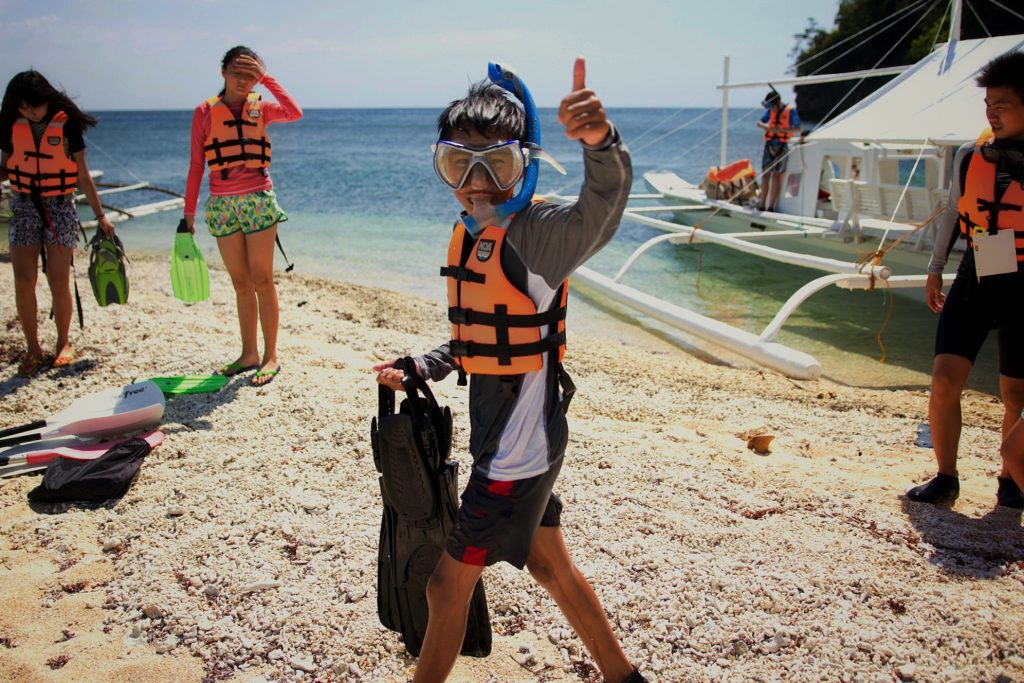With fins on her feet and a child-size life jacket snug around her chest, Alexis Diose, age 12, cautiously joins 29 other campers on Danjugan island’s beach. Putting on her snorkel mask, Alex easily blends into the crowd of eager campers, but Alex has a secret: This is her first time snorkeling and she doesn’t know how to swim. She’s not alone. Despite living in one of the world’s largest island nations, most Filipino’s don’t know how to swim. But with the support of the rest of the campers, and her team leader by her side, she dips her wide-eyed face below the surface and takes her first breath…

Camp Director, Jay Jaladoni, gives campers an up-close look at a starfish.
Alexis floats around the reef tentatively at first, but as time passes she grows more and more bold. After more than an hour, she emerges from the water with a huge smile on her face. “The fish and the seaweed, it looks so nice. The nature is beautiful underwater!” Later on she’ll tell me, “On this island I feel so good because of the trees, the fresh air, and the waves. It’s a beautiful place! The island teaches you how to love the environment.”
 Alexis overcomes her fear of the water in exchange for a glimpse of the world under the sea.
Alexis overcomes her fear of the water in exchange for a glimpse of the world under the sea.
That’s the whole point of Danjugan island – to serve as “Mother nature’s classroom” for young students like these. Located in the central Philippines, this 43-hectare island is home to seven different ecosystems including a limestone forest, a mangrove habitat, a bat cave and several lagoons filled with puffer fish and blacktip reef sharks. The island’s beach, affectionately called Typhoon Bay, features a reef with 240 species of coral, hundreds of tropical fish, sea turtles and octopus.
But the island doesn’t simply provide asylum for wildlife, it offers a life changing experience for the children that visit. Since its first marine camp in 1991, Danjugan has served as a hands-on hub for children to learn about biodiversity and understand the environmental issues facing their generation. Island Manager, Dave Albao explains it simply, saying “Danjugan is about hope.”
Albao leads a small staff comprised of volunteers and paid camp leaders who work together to instill a sense of wonder and responsibility for nature. Through lectures, hikes, snorkeling and team building, Danjugan’s staff teach campers how their actions can impact the world and inspire their friends. And the island’s caretakers practice what they preach. Accommodations are low-impact open-air cabanas, and electricity and water are provided via solar energy and composting toilets. And of course there are lots of games, a talent show, competitive team learning and Red Cross first-aid training – essentially everything that makes a good summer camp.
 Campers gently hold and feed honey water to a native bat on the island.
Campers gently hold and feed honey water to a native bat on the island.
Of course, this particular program has a few activities that you’re unlikely to find at the average summer camp. Take one of DEEP’s trademark night activities, an up-close encounter with one of the islands many fruit bats. Following a delightful video about echolocation (sung by “Batney Spears”) the campers get to feed honey water to a captive bat, and at the end of the evening, one lucky camper even gets to release the bat back into the night. During my visit, the campers even got to watch as I worked with a few of the islands biologists to stabilize the broken wing of a badly injured bat found along the beach the day before.
 On the final night, the campers write a personal pledge to Mother Earth. The pledges are put inside candle-lit boats and released into the sea.
On the final night, the campers write a personal pledge to Mother Earth. The pledges are put inside candle-lit boats and released into the sea.
By weeks end, the campers have made an amazing transformation, and on the final evening of camp, everyone gathers together under candlelight to write and share their life-long pledges to Mother Earth (Or as some campers call it, a pledge to “Mama E.”). This pledge represents not only the culmination of the campers experience, but another step forward for DEEP’s mission. Tasked with ushering in a generation who become stewards of nature, DEEP’s success can be measured by the experience of campers like these.
In a voice hoarse from laughter, Camper, Chino Jalandoni gives the best insight into the week. “It’s sad that our world is all ending with the trash, the littering and the increase in endangered animals. It’s sad that not really much people know about it. People don’t realize that they are killing animals, they are killing our world. I pledge to save this world, spread the word about our earth dying. I just hope the leaders of our world will help us.”
To learn more about DEEP and Danjugan Island visit DanjuganIsland.ph, like them on Facebook, or follow them on Instagram.
